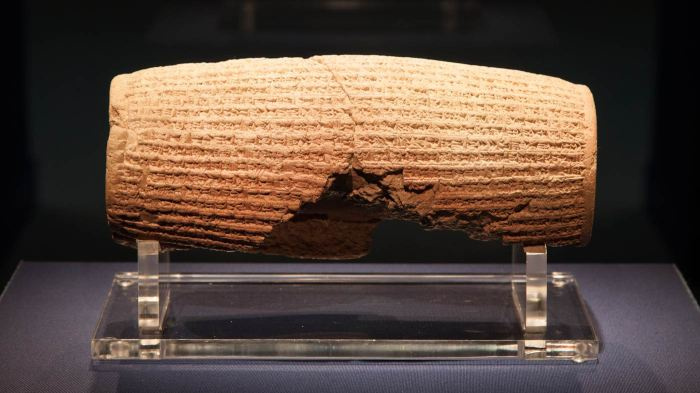The Case for A National Day of Cyrus the Great

(Picture: Cyrus Cylinder on display in the British museum.)
By: Kaveh L. Afrasiabi
There are several compelling reasons for a national day of Cyrus the Great, honoring the great Achamenid King whose rich legacy has been a source of national pride for the Iranian people for generations. This requires a timely initiative by the Iranian Parliament (Majlis) through the introduction of a new legislation citing the importance of designating the birthday of Cyrus the Great as a national day of celebration -- for good reasons:
First, already there is a growing, and irreversible, momentum toward this objective throughout Iran, reflected in the huge gatherings at Pasargad, used by the participants to reaffirm their Iranian identity rooted in ancient history. Instead of being indifferent or even averse toward this national revival of interest in Cyrus the Great and (with it) the pre-Islamic Iranian heritage, the Iranian government ought to adopt the necessary measures in order to accommodate the sentiments of the population favoring rightful honoring of Cyrus the Great.
Second, given Cyrus the Great's legacy of religious and ethnic tolerance, this initiative should be complemented by urging UNESCO to similarly recognize the Cyrus the Great's Day as an occasion to celebrate a pride of world's civilizations in today's context of "clashing civilizations."
Third, by officially adding the Cyrus the Great's Day to the calendar of events, the Iranian government would be acting in defense of its (cultural) national interests, which dictates respecting and enriching all facets of Iran's rich cultural reservoir. This, in turn, acts as a major source of "soft power" for Iran in the regional and international environment, that is, on the whole, it serves Iran's external image and its quest to enhance its sphere of influence partly through cultural power projection. Any failure to do so would be tantamount to forfeiting the issue in the hands of others seeking to exploit it for their anti-Iran agenda. Indeed, this is a very important arena of "cultural nation-building" to minimize in importance and or neglect the potential for misuse by Iran's adversaries.
Fourth, there is a complete fit and congruence between Iran's Islamist identity and its pre-Islamic cultural features that complement and enrich each other and deepen the (multi-dimensional) national identity founded on the bedrocks of its continuous long history shaping the contemporary Iranian consciousness. Any talk of "dual identity" is simply suspicious because it overlooks the internal integration and cohesion of the different parts of a national identity that evolves over time.
Fifth, this move is bound up with the on-going post-revolutionary reconstruction of political legitimacy in Iran, viewed as a long-term national project, that is process-oriented and entails conscious efforts to maximize the sources of national strength, including by tapping into the deep reservoir of cultural integration, some of which pertain to Iran's ever-present ancient history. In turn, this requires serious new investments in internal tourism of the numerous ancient sites, such as by building new hotels, railways, airports, etc., in vicinity of these sites and generating new sources of revenue as well.
Sixth, parallel to such efforts above-mentioned should be new efforts in archaeology, by offering new college courses in archaeology, revamping Iran's museums of ancient artifacts, and making the necessary changes in the school curriculum that reflect this evolutionary perspective with respect to the issues of national identity and its salient features. Iranian filmmakers, on the other hand, ought to consider an ambitious film project centered on the life of Cyrus the Great, which would in turn help the international cause of Iran's image and prestige in the international community.
In conclusion, the renewal of interest in Cyrus the Great is a historic necessity that must be answered through careful and comprehensive planning in tune with the inescapable wishes and desires of the Iranian people.
* The views expressed in this article are the author's own and do not necessarily reflect Iranian Diplomacy's editorial policy.

